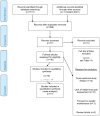Empirical evidence does not support an association between less ambitious pre-treatment goals and better treatment outcomes: a meta-analysis
- PMID: 23601605
- PMCID: PMC4366879
- DOI: 10.1111/obr.12038
Empirical evidence does not support an association between less ambitious pre-treatment goals and better treatment outcomes: a meta-analysis
Abstract
Setting realistic weight loss goals may play a role in weight loss. We abstracted data from randomized controlled trials and observational studies conducted between 1998 and 2012 concerning the association of weight loss goals with weight loss. Studies included those that (i) were conducted in humans; (ii) delivered a weight loss intervention; (iii) lasted ≥6 weeks; (iv) assessed baseline weight loss goals; (vi) assessed pre- and post-weight either in the form of body mass index or some other measure that could be converted to weight loss based on information included in the original study or later provided by the author(s); and (vii) assessed the correlation between weight loss goals and final weight loss or provided data to calculate the correlation. Studies that included interventions to modify weight loss goals were excluded. Eleven studies met inclusion criteria. The overall correlation between goal weight and weight at intervention completion was small and statistically insignificant (ρ=0.0 5 ; P = 0.20). The current evidence does not demonstrate that setting realistic goals leads to more favourable weight loss outcomes. Thus, our field may wish to reconsider the value of setting realistic goals in successful weight loss.
© 2013 The Authors. obesity reviews © 2013 International Association for the Study of Obesity.
Figures
Similar articles
-
The effect of weight management interventions that include a diet component on weight-related outcomes in pregnant and postpartum women: a systematic review protocol.JBI Database System Rev Implement Rep. 2015 Jan;13(1):88-98. doi: 10.11124/jbisrir-2015-1812. JBI Database System Rev Implement Rep. 2015. PMID: 26447010
-
Weight loss goals and treatment outcomes among overweight men and women enrolled in a weight loss trial.Int J Obes (Lond). 2005 Aug;29(8):1002-5. doi: 10.1038/sj.ijo.0802990. Int J Obes (Lond). 2005. PMID: 15917847 Clinical Trial.
-
How can I support my clients in setting realistic weight loss goals?J Acad Nutr Diet. 2014 Jan;114(1):176. doi: 10.1016/j.jand.2013.11.006. J Acad Nutr Diet. 2014. PMID: 24342606 No abstract available.
-
Obesity paradigm and web-based weight loss programs: an updated systematic review and meta-analysis of randomized controlled trials.J Health Popul Nutr. 2021 Apr 8;40(1):16. doi: 10.1186/s41043-021-00240-3. J Health Popul Nutr. 2021. PMID: 33832547 Free PMC article.
-
Effect of non-surgical, non-pharmacological weight loss interventions in patients who are obese prior to hip and knee arthroplasty surgery: a rapid review.Syst Rev. 2015 Sep 27;4:121. doi: 10.1186/s13643-015-0107-2. Syst Rev. 2015. PMID: 26410227 Free PMC article. Review.
Cited by
-
Assessing the state of obesity care: Quality, access, guidelines, and standards.Obes Sci Pract. 2024 Jul 17;10(4):e765. doi: 10.1002/osp4.765. eCollection 2024 Aug. Obes Sci Pract. 2024. PMID: 39026558 Free PMC article.
-
Weighing the Evidence of Common Beliefs in Obesity Research.Crit Rev Food Sci Nutr. 2015;55(14):2014-53. doi: 10.1080/10408398.2014.922044. Crit Rev Food Sci Nutr. 2015. PMID: 24950157 Free PMC article. Review.
-
Predictors of Preoperative Weight Loss in Morbidly Obese Adults Waiting for Bariatric Surgery: A Prospective Cohort Study.Obes Surg. 2015 Sep;25(9):1610-7. doi: 10.1007/s11695-015-1569-y. Obes Surg. 2015. PMID: 25616397
-
A randomized controlled trial of an innovative, user-friendly, interactive smartphone app-based lifestyle intervention for weight loss.Obes Sci Pract. 2021 May 3;7(5):555-568. doi: 10.1002/osp4.503. eCollection 2021 Oct. Obes Sci Pract. 2021. PMID: 34631134 Free PMC article.
-
Impact of Weight-Related Discrimination, Body Dissatisfaction and Self-Stigma on the Desire to Weigh Less.Obes Facts. 2017;10(2):139-151. doi: 10.1159/000468154. Epub 2017 Apr 22. Obes Facts. 2017. PMID: 28434008 Free PMC article.
References
-
- Prevention CfDCa U.S. Obesity Trends. 2011 http://www.cdc.gov/obsity/data/trends.html.
-
- Services. UDoHaH Obesity and African Americans. 2011 http://minorityhealth.hhs.gov/templates/content.aspx?ID=6456.
-
- Kruger J, Galuska DA, Serdula MK, Jones DA. Attempting to lose weight: specific practices among U.S. adults. Am J Prev Med. 2004;26:402–6. - PubMed
-
- Paeratakul S, York-Crowe EE, Williamson DA, Ryan DH, Bray GA. Americans on diet: results from the 1994-1996 Continuing Survey of Food Intakes by Individuals. J Am Diet Assoc. 2002;102:1247–51. - PubMed
-
- National Heart L. Blood Institute . Clinical Guidelines on the Identifcation, Evaluation, and Treatment of Overweight and Obesity in Adults. National Institute of Health; Bethesda, MD: 1998.
Publication types
MeSH terms
Grants and funding
LinkOut - more resources
Full Text Sources
Other Literature Sources
Medical
Miscellaneous



